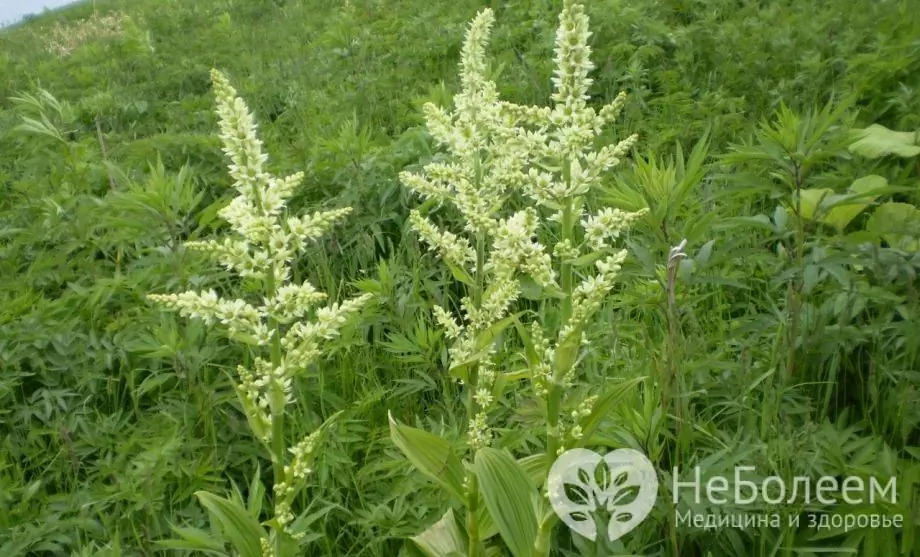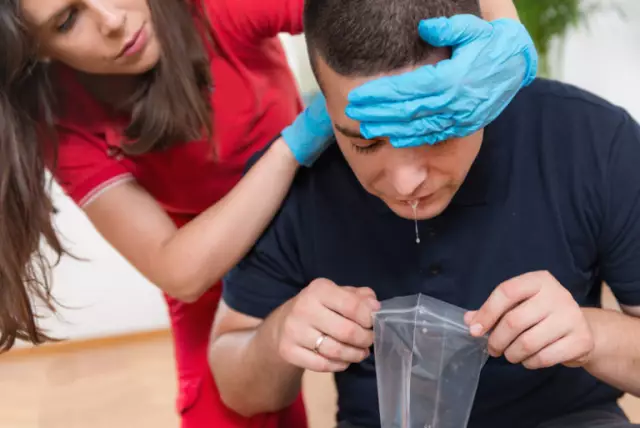- Author Rachel Wainwright wainwright@abchealthonline.com.
- Public 2023-12-15 07:39.
- Last modified 2025-11-02 20:14.
Hellebore poisoning
Chemeritsa is a perennial herb from the Melantiev family. Botanists have described over 20 of its species, of which three species grow on the territory of Russia: Lobel's hellebore, black hellebore and white.

Source: i.sakh.com
The Pharmacopoeia allows the use of hellebore as a plant material for the production of medicines. However, in view of the high toxicity of the plant, which can cause the most severe poisoning with a fatal outcome, preparations based on it are allowed to be used exclusively as external agents. The sale of homeopathic medicines and biologically active food supplements containing hellebore alkaloids is prohibited.
How does hellebore poisoning occur?
Hellebore poisoning most often occurs as a result of ingestion of a decoction of roots or alcohol tincture. Traditional medicine attributes to these drugs miraculous properties of getting rid of alcohol addiction, therefore, fans of unconventional drugs actively use this plant in the fight against drunkenness, which leads to life-threatening poisoning.
The hellebore, especially its roots, contains about 15 alkaloids, which determine the toxicity of this plant. Among them, neohermethrin, germitrin, proverathrin and veratramarin are the most toxic to humans.
These alkaloids have the ability to increase the sensitivity of the baroreceptors of the carotid sinus zone and the aortic arch, which has a powerful hypotensive effect. They also irritate sensitive nerves, resulting in vomiting, coughing and sneezing. The effect on the striated muscles is expressed in strengthening its contractions and slowing down relaxation, and on the smooth muscles of the gastrointestinal tract - in stimulating contractions.
Poisoning symptoms
Symptoms of hellebore poisoning appear already after 20-40 minutes from the moment the tincture or decoction of this plant is ingested. These include:
- discomfort and then abdominal pain;
- nausea;
- repeated vomiting;
- diarrhea;
- decrease in heart rate;
- a sharp decrease in blood pressure;
- increased salivation;
- mental agitation;
- pallor of the skin;
- dizziness and / or headache;
- excessive sweating;
- flatulence;
- dyspnea.
When conducting an ECG, the victim reveals sinus bradycardia, weakness of the sinus node, and intracardiac conduction disorders.

Source: depositphotos.com
First aid for hellebore poisoning
In case of poisoning with hellebore, it is necessary to urgently call an ambulance, and, without waiting for the arrival of the medical team, proceed to provide the victim with first aid. The patient's life depends on the correctness of its implementation.
If the poisoned person is conscious, then he should perform a gastric lavage, which will prevent further absorption of the poison into the bloodstream. To do this, drink a few glasses of warm water and induce vomiting by pressing on the root of the tongue.
After that, the victim should be given a suspension of activated carbon to drink. For its preparation, 50-60 tablets of this drug should be crushed into powder and the resulting powder should be mixed with a glass of water.
To speed up the elimination of plant poison from the intestines, it is necessary to use a saline laxative, such as magnesium sulfate.
Considering that with vomiting and diarrhea, the patient loses a large amount of fluid, which is fraught with dehydration, it is necessary to carry out oral rehydration. To do this, he is given to drink Rehydron's solution (in small portions, but often). To prepare it, it is necessary to dilute one sachet of the medicinal glucose-salt mixture in one liter of boiled water.
When is medical attention needed?
In case of poisoning with hellebore, the victims always need urgent medical attention. They are hospitalized in the intensive care unit and intensive care unit of poison control centers.
To accelerate the elimination of toxins from the body, forced diuresis with alkalization (alkalization) of urine is used. There are no specific antidotes to hellebore alkaloids, symptomatic therapy is carried out. Correct the central hemodynamic disorders, if necessary, carry out anticonvulsant therapy.
Possible consequences
Often, despite the ongoing treatment, hellebore poisoning ends in death, caused by serious disorders of systemic hemodynamics, poorly amenable to drug correction.
They are especially dangerous for children, whose body is highly sensitive to any poisonous substances. Also, the hellebore is fraught with great danger for people suffering from cardiovascular diseases.
Prevention
To prevent hellebore poisoning, it is necessary to conduct active explanatory work with the population through the media, explaining how dangerous it is to use decoctions and tinctures of this medicinal plant inside for the purpose of treating alcohol dependence.
It is not recommended to purchase hellebore water for the treatment of head lice. Currently, pharmacies have many other equally effective and at the same time safer drugs.
If hellebore preparations are still used for the treatment of pediculosis or for veterinary purposes, then they should be stored out of the reach of children, best of all in a lockable cabinet.
YouTube video related to the article:

Elena Minkina Doctor anesthesiologist-resuscitator About the author
Education: graduated from the Tashkent State Medical Institute, specializing in general medicine in 1991. Repeatedly passed refresher courses.
Work experience: anesthesiologist-resuscitator of the city maternity complex, resuscitator of the hemodialysis department.
The information is generalized and provided for informational purposes only. At the first sign of illness, see your doctor. Self-medication is hazardous to health!






